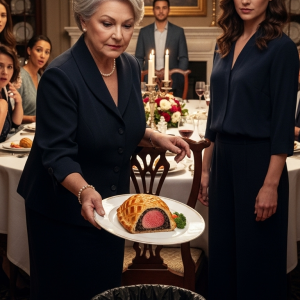The afternoon sun, thick and golden as honey, slanted across the magnificent gardens of the Rosewood estate. For Lily Sterling, this place was not just a home; it was a sanctuary, a living library of scents and colors. She gently pruned a dead leaf from a ‘Queen Elizabeth’ rose, her touch as delicate as a surgeon’s. This garden wasn’t land to her; it was a collection of living stories, each petal and thorn a word in a language only she and her late father had truly shared.
From the other end of the sprawling lawn, her brother’s voice, sharp and clinical, cut through the peaceful air. Edward was on his phone, pacing the flagstone path like a caged panther, his expensive Italian shoes a jarring intrusion on the soft, manicured grass.
“The garden? Paul, the whole three acres are a complete write-off,” he barked into his phone, his voice dripping with condescension. “We bulldoze it. I’m thinking a 30-story luxury condo tower, The Rosewood Spire. We can put a golf simulator in the lobby. The old man’s sentimentality is about to fund my early retirement.”
Lily closed her eyes, a familiar ache spreading through her chest. This was Edward’s nature. He saw the world not in shades of beauty, but in shades of green. To him, this garden, their father’s masterwork, was just “unrealized capital,” a “waste of monetizable space.”
She remembered her father’s words, spoken to her so many times in this very garden. “As long as these flowers bloom, Lily-bug,” he would say, his voice a warm rumble, “a part of me will always be right here with you.” She had thought it was just sentiment. She had no idea it was a legally binding promise.
Her father had tried to warn Edward, to instill in him some sense of legacy beyond the balance sheet. In a flashback that felt as vivid as yesterday, she remembered a tense dinner on the veranda. “You look at this land and see square footage, Edward,” their father had said, his voice heavy with a rare disappointment. “I see a century of roots. There is a difference between a price and a value, and your inability to see that will be your greatest failing.” Edward had simply rolled his eyes, dismissing it as another of the “vanity projects” the old man was always engaged in—those endless, quiet meetings with conservationists and teams of lawyers.
Now, on the eve of the will reading, Edward’s victory seemed absolute. He would get the land, the money, the empire. And Lily, all she hoped for was that he might, in some uncharacteristic fit of mercy, let her take a few cuttings from her father’s favorite rose bushes before he turned it all to mud and concrete.
The law offices were a silent, mahogany fortress, a place where family legacies were either cemented or shattered. Edward strode in, the conquering hero, his tailored suit radiating an aura of success. He gave Lily a brief, pitying glance as she took a seat, her own simple dress feeling inadequate in the oppressive quiet.

Mr. Abernathy, their father’s lawyer for forty years, began the reading. His voice was a dry, emotionless drone. The first part was as everyone expected. The entirety of Sterling Global Enterprises, all subsidiary holdings, stocks, bonds, and liquid assets—a fortune north of eighty million dollars—was bequeathed to his son, Edward Sterling.
Edward leaned back in his chair, a slow, triumphant smirk spreading across his face. He had won. The lion’s share. All of it. He resisted the urge to pull out his phone and text his architect the final go-ahead.
Lily felt a quiet resignation. She had expected this. She had never been a contender for the throne. She was the gardener’s daughter, not the prince.
Abernathy cleared his throat and continued to the final bequest. “And to my daughter, Lily Sterling,” he read, his voice softening almost imperceptibly, “who alone understands the true nature of my life’s work, who sees the value beyond the price. To her, I leave the sole and exclusive right to care for and enjoy the flowers in the garden of the Rosewood estate, for the duration of her natural life.”
The silence that followed was broken by a short, sharp laugh from Edward. He shook his head, looking at his own lawyer with an expression of amused disbelief at his father’s final act of sentimentality.
“The flowers,” he mouthed silently, a cruel smile playing on his lips. He finally did pull out his phone and, under the table, began to type a message to his architect: “We’re on. Get the demolition permits filed tomorrow morning.”
He had everything he wanted. The money, the company, and now, the clear title to the land. His sister could “enjoy the flowers” for the few weeks it took him to get the bulldozers lined up. He began to stand, the meeting clearly over in his mind.
“We’re not quite finished yet, Mr. Sterling,” Abernathy said, his voice suddenly sharp as a razor’s edge. Edward paused, halfway out of his seat, an annoyed look on his face. “Please, sit back down. We now need to discuss the legal obligations and encumbrances attached to your inheritance, specifically as they pertain to Ms. Sterling’s legacy.”
Edward sank back into his chair, a flicker of confusion crossing his features. “Obligations? What obligations? The will was perfectly clear.”
“The will, as it was read for public record, was indeed clear,” Abernathy agreed, opening a thick, leather-bound binder on the desk. “However, it operates in conjunction with a pre-existing and irrevocable legal entity: The Rosewood Botanical Conservation Trust, established by your father five years ago.”
He slid a document across the table. “Your father, over a period of years, transferred his entire ownership of the 40-acre Rosewood estate, including the house and all gardens, into this private conservation trust. The estate is not part of his personal assets. It is the sole asset of the Trust.”
Edward stared at the lawyer, his smirk finally vanishing, replaced by a cold, hard knot of apprehension. “What are you talking about?”
“I’m talking about the charter of the trust,” Abernathy continued, his voice relentless. “A charter which your father, as its founder, had the sole right to amend. The term ‘to care for and enjoy the flowers,’ Mr. Sterling, is not a poetic turn of phrase. It is a specifically defined legal designation within that charter. It is the official, unchangeable title for the lifetime Chair of the Board of Governors of the Trust.”
The lawyer paused, letting the words sink in. “Your sister doesn’t just get to look at the flowers, sir. In the eyes of the law, she is the garden. She has been granted full, unilateral, and lifelong control over the Rosewood estate and all its operations.”
The color drained from Edward’s face. He looked at Lily, who was staring at the lawyer with an expression of utter, dawning astonishment.
“And that,” Abernathy said, turning a page in the binder, “brings us to you, Mr. Sterling. The charter stipulates that the Trust is to be funded by a mandatory, perpetual endowment. The source of that endowment is also specifically designated.”
He looked directly at Edward, his expression devoid of any pity. “The charter legally requires that seventy-five percent of all liquid assets and dividends from all business holdings bequeathed to you be transferred into the endowment fund for the Trust, to be managed and disbursed at the sole discretion of the Chair. Your sister.”
The room was utterly silent. Edward’s face had collapsed, moving through stages of disbelief, to rage, to a final, ghastly, pale horror. He hadn’t just been outmaneuvered. He hadn’t just lost the land he was planning to develop. He had been legally, brilliantly, and permanently shackled. He was now the primary, unwilling benefactor for the very legacy he had despised. His father hadn’t just disinherited him from the land; he had forced him to pay for its preservation for the rest of his life.
The days that followed were a storm of impotent rage for Edward. He hired a team of the most aggressive corporate lawyers in the state, paying them a fortune to try and break the trust. They spent a week poring over the documents before returning with a unanimous, grim verdict. The trust was an ironclad, legal work of art. Their father, with the help of the best conservation and estate lawyers in the country, had built a fortress. There were no loopholes. There was no way out.
His first official meeting with the new Chair of the Rosewood Trust was the single most humiliating experience of his life. It was held not in a corporate boardroom, but at the small, sun-dappled table on the very veranda he had planned to demolish.
Lily was not the quiet, timid sister he had always known. She was not vengeful or triumphant. She was worse. She was professional. She had a folder in front of her, filled with budget proposals and project outlines drafted by a team of renowned botanists and landscape architects.
“Good morning, Edward,” she began, her voice calm and steady. “As per the charter, I am presenting you with the first quarter budget for the Rosewood Gardens. It includes the restoration of the Victorian greenhouse and the initial hiring of a full-time horticultural staff. The first capital call from the endowment will be for three million dollars. The transfer details are on the last page.”
He stared at her, speechless. He was used to being the one who commanded, who decided, who wrote the checks on his own terms. Now, he was just the bank. A bank that his “naive” little sister had the keys to.
“This is insane,” he finally sputtered. “Three million dollars for dirt and flowers?”
“It’s for our father’s legacy,” Lily replied, her gaze unwavering. “The one he entrusted to me, and the one he has legally obliged you to fund. The transfer is due within thirty days, or you will be in breach of the charter.”
Her quiet competence was a deeper insult than any gloating could have been. She wasn’t playing a game with him; she was simply executing her duties, fulfilling her father’s vision. His own arrogance, his own shortsightedness, had made him a supporting character in her story, the reluctant villain who, by legal decree, was now forced to finance the hero’s quest.
Two years later, the Rosewood estate was unrecognizable. It was no longer a private sanctuary, but one of the nation’s most breathtaking public botanical gardens. The Victorian greenhouse had been restored to its former glory, waterfalls cascaded into serene koi ponds, and thousands of visitors wandered the paths every week, free of charge.
Lily was not a distant, wealthy heiress. She was the hands-on director, her boots often muddy, her knowledge of Latin plant names encyclopedic. She had established educational programs for inner-city children, therapeutic horticulture classes for veterans, and an apprentice program for young landscape architects. She had taken her father’s gift and had given it, in turn, to the world.
Edward was still the CEO of Sterling Global, a wealthy man by any measure. But he was a man in a gilded cage. A significant portion of his profits and his energy was spent funding a project he loathed, his success a constant reminder of his ultimate defeat. His grand vision for the Rosewood Spire was now a bitter joke, a ghost of an ambition that had been thwarted by a dead man’s love for his daughter and his flowers.
One sunny afternoon, Lily was leading a tour of schoolchildren through the new sensory garden. A little girl with bright, curious eyes asked her, “Did you plant all these flowers by yourself?”
Lily smiled, a genuine, peaceful smile that reached her eyes. “No, sweetie,” she said, looking out over the vibrant, blooming landscape. “My father planted the first seeds a long, long time ago. I’m just the lucky one who gets to help them grow.”
She had found her purpose, not in owning a fortune, but in cultivating one. While her brother was forever trapped by the price of things, she had discovered the infinite, liberating value of a legacy. She had proven that the greatest inheritance isn’t something you can possess, but something you can nurture, something you can share, and something that, against all odds, you can help to bloom.




